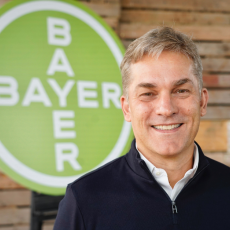You have been in the world of agriculture since your childhood. What kept driving you in this sector through the years?
I am really passionate about the impact that Bayer can have in agriculture. We work with millions of farmers, helping them succeed and provide food for a growing population, and this is extremely rewarding. More personally, I love engaging with the great scientists who are working in Bayer and who are doing research every day on the innovations needed to transform agriculture for better.
What are the major areas which Bayer is devoted to and what are the recent innovations you feel most excited about?
In our Crop Science division, we invest EUR 2,6 billion per year in R&D. This is by far the largest investment in the entire industry.

Agriculture is at a tipping point today. Over the last two decades, we saw a major revolution with increasing yield and productivity. But into the next two decades we will witness two simultaneous revolutions and with that a major transformation of agriculture: we need to produce more food to meet the 70% rise in demand resulting from a growing world population while – at the same time - fighting climate change.
This is tough but we think it is manageable if we focus on innovation. Concretely, we at Bayer have established five key innovation areas to cope with these changes: biotechnology, gene editing, digital farming, biologics and new crop protection chemistry. All these, working together, will make farmers successful in terms of producing more with fewer inputs and restoring more nature at the same time, which is the meaning of regenerative agriculture to us.
In terms of genetics, today we are capable of precision breeding. Where in the past breeders had to select the best hybrids from a variety, we can now design them. In the biotech area we are working with novel technologies such as RNA in corn that can fight pests and reduce the need for plant protection products at the same time. We are soon launching new traits in cotton and soybean, and we are working on hybrid wheat. When it comes to corn, we are launching an entirely new cropping system, the smart corn system, including our breakthrough innovation short-stature corn that is able to resist strong winds and extreme weather much better than regular corn. Concerning gene editing, our new cover crop CoverCress is the next example of a major breakthrough. It enables farmers to make use of the benefits of a cover crop for soil health and fertility. At the same time, CoverCress can be harvested, and farmers can sell it to biodiesel producers thus generating a new revenue stream. With regards to biologics, we are working on developing seed treatments that could help corn, wheat and rice to absorb nitrogen from the atmosphere and reduce the use of synthetic fertilizer whose production is very energy-consuming. And to offer one more example, we are also working on a new mode of action for herbicides that will help with crop protection – the first major development in over thirty years. All of these developments are catalyzed by digital solutions.
Farmers’ profitability has traditionally been an issue. Do you believe that this new revolution you are referring to can address that?
Whenever we speak of regenerative agriculture, our first concern is helping farmers produce more, while restoring more at the same time. If these two parts of the equation do not take place simultaneously, farmers will not engage in this transformation. If we help farmers be successful, we will be successful. Regenerative agriculture is all about a farmers’ profitability and sustainability. And most importantly, this is not just another part of our portfolio, it is our core business.
As technologies are advancing rapidly, safety is naturally on many people’s minds. How do you address concerns and how do you manage the different regulatory frameworks?
Let me be clear: the safety of our products is always our first priority. People can rely on this. As we work on increasing food production, we are focused on helping to produce safe, affordable and healthy food. All our technologies have very rigorous internal safety standards, and we comply with external regulations, which are quite strict. I think it is safe to say that today we have the best and safest food ever.
Concerning regulatory systems, we adjust our offering depending on the market. In the Americas, for example, biotechnologies are widespread. In the EU, on the contrary, biotechnologies for farmers do not exist, so we invest in conventional breeding, etc. When we talk about regenerative agriculture, it is driven by the outcome of more production per hectare while reducing the environmental footprint. So, even if regulations differ between markets, we are always looking for the same outcome.
What would you qualify as your most considerable challenges at the moment?
As a result of the Russian invasion of Ukraine we have realized how fragile the food system can be, and how heavily impacted it is by geopolitics. It is a shame that world hunger has been increasing again within the last years. We therefore work with governments around the globe to help them shape their food systems to increase food security. ‘Resilience’ is a key word here. I was in India recently and I spoke with a small farmer about the impact of our new direct seeded rice. This innovation helps farmers produce more rice, while dramatically reducing the need for water and energy. This is a great example for how to create resilient agriculture. Science is always at the core. And as I have pointed out before, climate change is our biggest challenge. While we need to fight it, we also need solutions that help farmers adapt to climate change. That is why we are working on innovative crops that are more resilient to floods or drought.
What would you like to achieve in the next few years of your tenure at Bayer?
One of my key priorities is continuing to foster a work environment that people like returning to, so that they can deliver their best and keep helping farmers. In other words, I hope that my colleagues will be able to say that Bayer is the best place to work at, and that our clients will say that Bayer is the best partner to collaborate with. And to close the loop here: I want to use all my power and dedication to drive regenerative agriculture as a win-win for farmers and society.






